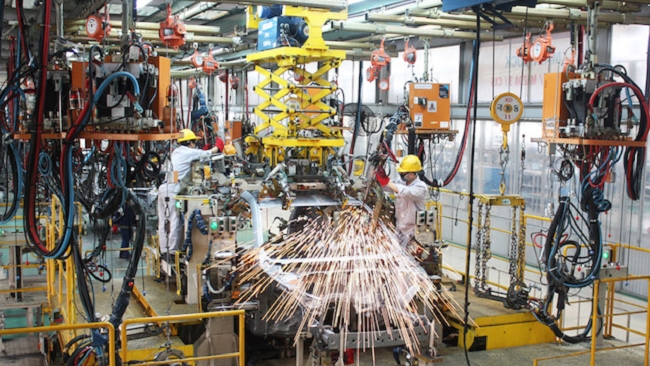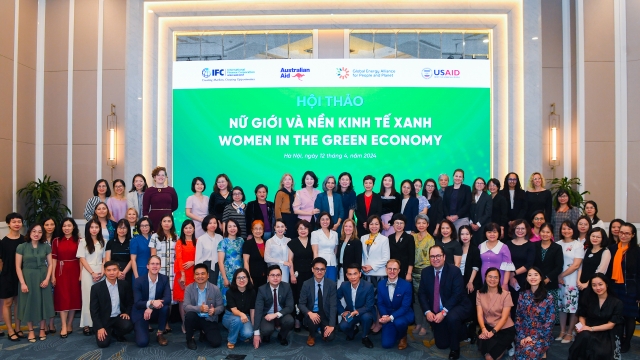National Focus
Sales from locally assembled cars surpassed imported ones in May
According to Vietnam Automobile Manufacturers' Association, sales of complete knocked-down cars was 19,467 units, accounting for nearly 85 per cent of the total market in last month.

The recent sales report of Vietnam Automobile Manufacturers' Association (VAMA) shows that sales of the total industry this May are at 23,065 units, nine per cent higher than the same period of last year when the Decree No. 116 had not come into effect.
Specifically, 15,397 units were passenger cars, 13 per cent higher than the same period of last month; 6,890 units were commercial vehicles and 778 units were special-purpose vehicles, eight per cent and 36 per cent lower than last May, respectively.
However, VAMA's report shows that the automobile market's sales last month were mostly from complete knocked-down (CKD) cars. In May 2018, sales of CKD increased by nine per cent from last month to reach 19,467 units.
Meanwhile, the number of complete built-up (CBU) cars handed over to customers was 3,598 units, accounting for only about 15 per cent of the whole market.
In the first five months of this year, the total number of CKD sold increased by 10 per cent compared to the same period of last year while the figure for CBU was down 46 per cent versus last year.
This situation is quite understandable as there have been only two brands of VAMA namely Honda and GM Vietnam being able to import cars into Vietnam and deliver them to customers. However, this could not support to increase the sales of imported cars in the passing time.
Whereas, duty-free cars of other companies are expected to reach Vietnam market only by the end of next month or early this August.
Statistics of both General Statistics Office of Vietnam and General Department of Vietnam Customs show that the import of car in this year's first five months decreased dramatically from 43,274 units in the first five months of last year to only 9,000 units in the first five months of this year.
For months, sales of Truong Hai automobile company (THACO), a domestic automobile manufacturer, has surpassed Toyota whose main activity is importing cars from ASEAN countries.
In the first five months of this year, THACO sold a total of 42,438 cars, nearly doubling 21,482 units of Toyota. This May, the former delivered 8,748 units to customers while the figure for Toyota was just 4,752 units.
However, sales of Toyota in the last few months mostly came from its CKD models including Vios, Camry, Innova and Corolla Altis.
Decree No.116 still puts burden on European automotive enterprises
Resolution 68: A turning point in Vietnam's private sector policy
As Vietnam sets its sights on becoming a high-income country by 2045, Resolution 68 lays a crucial foundation. But turning vision into reality requires not only good policy - but also unwavering execution, mutual trust and national unity.
Vietnam plans upgrade of Gia Binh airport to dual-use international hub
Vietnam plans to upgrade Gia Binh Airport in Bac Ninh province into a dual-use international airport to support both military and civilian operations, the government said on Friday.
Lives under the scorching sun: Outdoor workers racing against climate change
Under unforgiving conditions, the outdoor workers - the backbone of urban economies - endure the harshest impacts of climate change while remaining overlooked by social safety nets. Their resilience and struggles highlight the urgent need for better protection in the face of rising temperatures and precarious livelihoods.
CEO Group chairman unveils guide to Vietnam real estate for foreigners
Doan Van Binh, Chairman of CEO Group and Vice President of the Vietnam National Real Estate Association, introduced his latest book, “Vietnam Real Estate for Foreigners,” at a launch event in Hanoi on Friday.
Women leading the charge in Vietnam's green transition
Acting for increased women’s participation and leadership in climate action, Vietnam can accelerate a transition that is more inclusive, just, and impactful.
Steam for girls: A journey of passionate and creative girls
The "Steam for girls 2024" competition provides a creative platform for Steam and an opportunity for students to connect with peers from various regions within Vietnam and internationally.















.png)
.png)

























